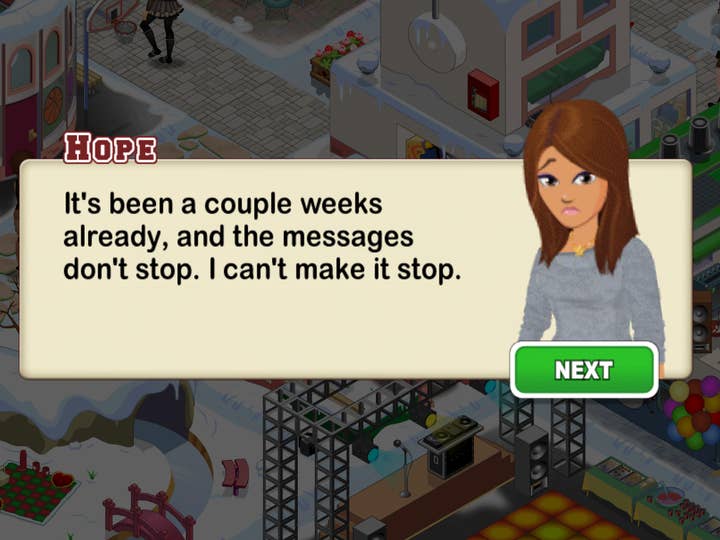The game that saved a life
The real life drama behind High School Story's cyberbullying storyline
Titanfall and Call Of Duty might be the games that grab the headlines, but often it can be the smaller, unexpected titles that make a real impact on someone's life. In the case of Pixelberry Studios and its game High School Story the team got a very real sense of that potential impact when a young, suicidal player contacted them.
"We have kind of an in-game chat system for people usually asking questions either about the game or telling us about problems that we're having with the game, but this girl told us that she was trying to kill herself," studio co-founder Oliver Miao says.
"She said that it was because of our game that she was still there."
If you don't know High School Story the premise behind it will still be instantly recognisable to you. A mobile title for iOS and Android it allows players to customise a character and explore a high school environment, playing through quests, updating the school and following other student's stories.It was when the team was working on a cyberbullying storyline for a character called Hope that it got the call.
"We were very, very shocked and surprised. We were also scared because we didn't know how to best respond so we actually called the suicide prevention hotline ourselves to get advice," continues Miao, with the tone of a man who still can't quite believe it himself.
Pixelberry was advised to direct the girl towards professional help, which it did, but it also kept in regular contact with her.

"We didn't want her to feel like we were just pushing her away to someone else because obviously she felt like she could relate to us because of our game. We let her know that we cared about her and that we were there to listen anything she had to say but that we really thought she should get help."
"We exchanged messages with her for about a week where we learned more about her. It was getting kind of scarier and scarier for us. Fortunately at the end of the week she told us that she was finally getting professional help. She actually mentioned in her message, she said that it was because of our game that she was still there. We felt so much relief and at the same time, we realized how powerful the game really can be in affecting its players."
Introducing a bullying storyline had already been important to the Pixelberry team after internal discussions revealed a number of the team had first hand experience, but their experience with the young girl made them even more determined to tackle the issue in a helpful and sensitive way. Through Playmob, a company that connects developers with non-profits, Pixelberry partnered with a charity called Cybersmile that advised them throughout the development process. Then the storyline was released, and both began to track player reactions.
"We saw in comments and reviews from players the story line really resonated with them, especially because it was something that they could relate to. Whether they'd been bullied themselves, if they hadn't been bullied themselves then they had friends who often had been bullied. They really appreciated the fact that we were tackling an issue that was personal to them."
"Charity Cybersmile said that every week over a hundred players are reaching out to them because of our game"
"In terms of Cybersmile themselves, they have been tracking the number of the players who reach out to them and mention High School Story. They said that every week over a hundred players are reaching out to them because of our game. Those are often players who are either being bullied or self-hurting or thinking about suicide. We were floored that we could have so many people starting to talk to Cybersmile because of our game. "
In return Pixelberry introduced a Stop Cyberbullying! bundle to the game that has so far raised over $200,000 for Cybersmile.

Perhaps such a story shouldn't seem so shocking or so incredible considering how many young people the industry has access to in an interactive and engaging way. In the early 80s and into the 90s television aimed at teenage audiences was very issues focused, dealing with bullying, drugs and teenage pregnancy on a regular basis. So far the majority of games have chosen to avoid those issues in favour of less controversial subject matter like shooting people or hitting them with swords.
"Honestly when we first started, it had not been important to us as a studio to necessarily give back financially or to help support non-profits financially," admits Miao, but the studio has always thought about how to be inclusive and diverse. The game is noticeably racially diverse, and there's no restriction on same sex characters having relationships.
"A lot of games don't necessarily have racial diversity. We wanted our game to reflect the real world. That's something we did from the start, as well as we having dating in the game. From the beginning we just made the decision that we'd let players date whoever they wanted to within the game and not be tied to gender."
So while AAA titles are struggling with inclusivity, to Pixelberry it came naturally. Part of that is an advantage of having a smaller team - decisions like that can be made and made quickly.
"When you're a small start-up, you can very quickly tackle the things that are important to you. It's kind of all about the culture of your studio and what's important to the people of your studio. "
And to its players High School Story is just a fun game they enjoy playing, the diversity and tougher storylines are just part of that experience. Pixelberry also works very hard to make sure that it's talking to its audience, not at it. And browncoats and Benedict Cumberbatch both play a role.

"We actually have some high school interns who work full-time during the summer and during the school year they come in part-time. They help keep us on the pulse of teens," he says, describing what is frankly an amazing summer job for any young person.
"One of the reasons we have so many writers [eight in a team of 16] is because they all kind of have different viewpoints on things, so they all stay really immersed in teen culture or pop culture. It's what we've done in the game, we've actually incorporated a lot of that is because our players really seem to latch on to that. We'll make references to shows that are doing really well, like Sherlock or cult favorites like Firefly."
After its experience the Pixelberry of the future is planning to cover more issues, and to include more storylines around the issue of cyberbullying. That one girl and her desperate message has changed the culture of a whole studio.
"When we first started this game, we had no idea that we'd be able to have this type of impact or to affect players that directly. It's been a really positive experience in our studio, as well. Everyone here feels really excited about the fact that not only are we doing something we love, which is making games, but we're also able to make a difference while we do that."
To find out more about Cybersmile's work you can visit their website.

